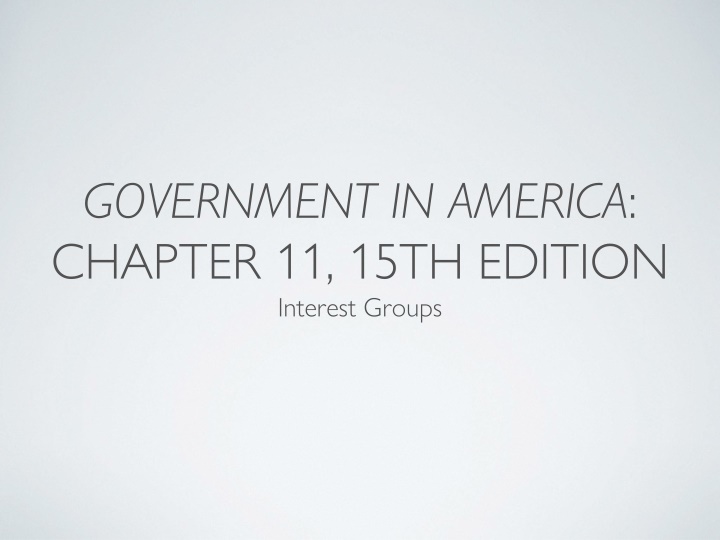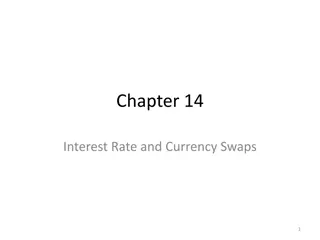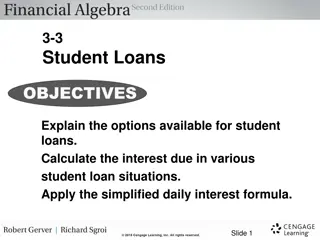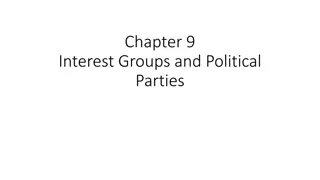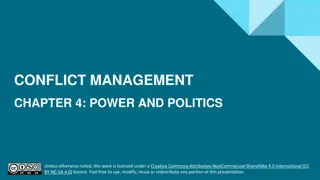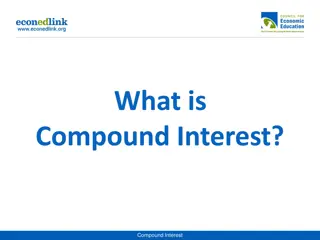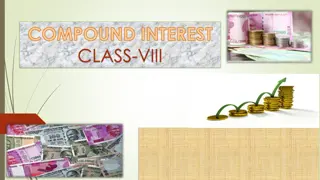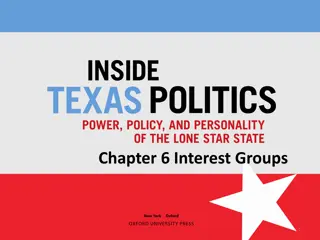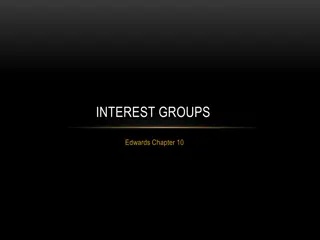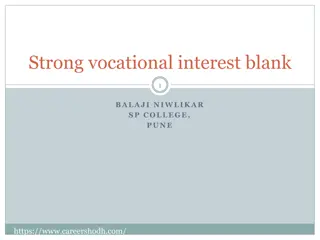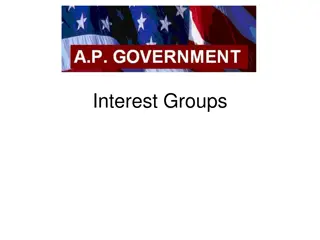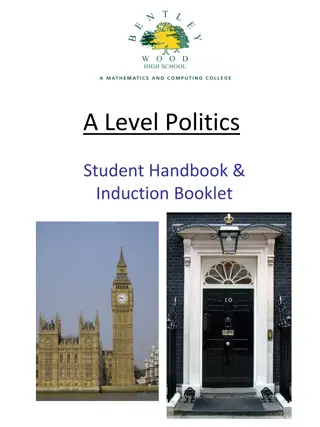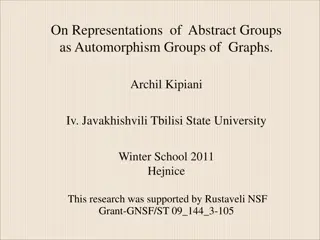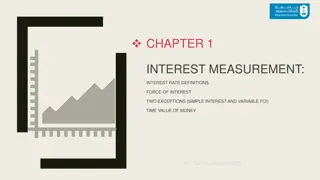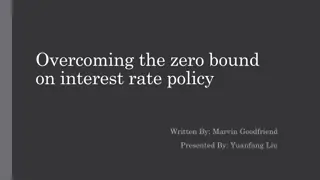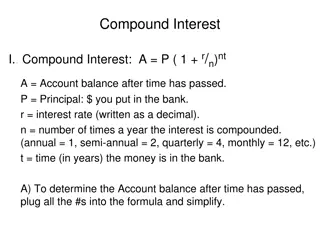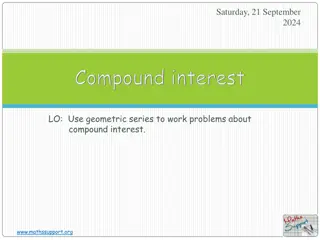Role of Interest Groups in Politics
Interest groups play a crucial role in politics by sharing policy goals and working towards influencing national, state, and local policies. The theories of interest group politics, including pluralism, elitism, and hyperpluralism, highlight different perspectives on the power and influence of interest groups in the political landscape. Understanding the factors that contribute to the success of interest groups, such as organization size and collective goods, sheds light on their effectiveness in advocating for policy changes.
Download Presentation

Please find below an Image/Link to download the presentation.
The content on the website is provided AS IS for your information and personal use only. It may not be sold, licensed, or shared on other websites without obtaining consent from the author.If you encounter any issues during the download, it is possible that the publisher has removed the file from their server.
You are allowed to download the files provided on this website for personal or commercial use, subject to the condition that they are used lawfully. All files are the property of their respective owners.
The content on the website is provided AS IS for your information and personal use only. It may not be sold, licensed, or shared on other websites without obtaining consent from the author.
E N D
Presentation Transcript
GOVERNMENT IN AMERICA: CHAPTER 11, 15TH EDITION Interest Groups
THE ROLE OF INTEREST GROUPS What is an interest group? Group of people that share policy goals and engage in politics to meet their goals Interest groups are protected via the 1st amendment - organize (assembly) What are the goals of interest groups? To change policy on the national, state, and/or local levels How are interest groups different than political parties? Interest groups don t run their own candidates Interest groups are specialized in one, or a few, policies
THEORIES OF INTEREST GROUP POLITICS Pluralism Believe that interest groups help bring inspiration to all Group Theory of Politics: Groups link people and government Groups compete Hard for one group to dominate Groups follow the rules Groups use resources to their advantage Labor using numbers vs. Big Business using $
THEORIES OF INTEREST GROUP POLITICS Elitism View many interest groups as insignificant Few people and groups have real power How elitists view interest groups: The number of groups doesn t matter, only which ones are powerful Large corporations have tremendous power Interlocking directorates have power - individuals sit on boards of similar organizations Corporations prevail on big issues
THEORIES OF INTEREST GROUP POLITICS Hyperpluralism Belief that interest groups contribute to gridlock - too many views to appease Iron Triangle: Relationship between interest groups, Congress, and the bureaucracy (government agencies that carry out legislation) All parts of the iron triangle protect their own interests Hyperpluralists view of interest groups: Groups become powerful as government seeks to appease all Policy that is confusing and contradictory often emerge as a result
WHAT MAKES AN INTEREST GROUP SUCCESSFUL? Smaller groups are often more successful at organizing than larger groups The Surprising Ineffectiveness of Large Groups Potential groups - people who could be members Actual groups - those that do join a group Collective goods: Something that benefits everyone, regardless if they are in a potential or actual group Example: Higher minimum wage helps those in and not in unions Free-rider problem: Not joining a group because an individual could still benefit Why are smaller groups often more successful than larger groups? More to gain/lose Class-action lawsuit spread across millions of people is a small amount of $, but could be substantial to companies Selective Benefits: Organizations can restrict benefits to members only (AAA - special trip discounts)
WHAT MAKES AN INTEREST GROUP SUCCESSFUL? Intensity Politicians are more likely to react to groups that show they care Single-issue group: Tend to focus on one issue (abortion) Hesitant to compromise Financial Resources Interest groups tend to favor the wealthy However, interest groups aren t always successful Interest groups often square off against each other
HOW GROUPS TRY TO SHAPE POLICY Lobbying Hope to influence government to achieve their goals Many former members of Congress are lobbyists Two types of lobbyists: Those that are paid by a group, regular employee Those that are hired on a temporary basis Lobbying Disclosure Act of 1995: Certain organizations must report: Their clients and amount of $ paid 4 ways lobbyists can help Congressmen and women Provide valuable information (experts on certain policies) Help provide strategies to pass legislation Provide campaign strategy Provide ideas and innovations
HOW GROUPS TRY TO SHAPE POLICY Financially assisting candidates (Political Action Committees - PACs) Electioneering What is it? Almost 1/2 of House Members get most of their campaign $ from PACs $305 million from PACs in 2008! PACs overwhelming support incumbents Why do PACs choose certain candidates? Similar interests Support issues they support Have a geographic connection (from a district where PAC does business) Involved in agencies that affect the PAC Influential leadership positions Interest groups also are involved with elections through: Recruit candidates for office, endorse individuals, help volunteer, etc.
HOW GROUPS TRY TO SHAPE POLICY Litigation When interest groups fail, courts are often an avenue for change Civil Rights Movement of the 1950s and 1960s **Amicus Curiae briefs*** (Friend of the court) Allows groups to file briefs to the court to give their opinion Class action lawsuits: Combines people in similar situations into one large case Example - Former NFL players suffering from concussions Going Public Interest groups often use their image to help sway public opinion
TYPES OF INTEREST GROUPS Economic Interests The government provides subsidies to many different groups Labor Unions seek better working conditions, higher wages, and fewer hours Union shop - requires workers to join a union Right-to-work-laws - does not require workers to join unions Taft-Hartley Act (1947) - allowed states to pass right-to-work laws Decline of union membership: Lower wages in other countries affects employment in US (outsourcing) Many workers don t believe they will benefit from unions
TYPES OF INTEREST GROUPS Business Many corporations have offices in D.C. Businesses often have differing goals: RRs don t want more highways, trucking companies do Environmental Interests Seek to combat pollution and global warming Oppose off-shore drilling
TYPES OF INTEREST GROUPS Equality Interests National Association for the Advancement of Colored People (NAACP) Argued before the Supreme Court in Brown v. Board Fought discrimination throughout the US National Organization for Women (NOW) Advocate the passage of the Equal Rights Amendment (ERA) Consumer and Other Public Interest Lobbies Public Interest Lobbies - organizations that seek to a collective good, and which members of the organization do not directly benefit Example - consumer advocate groups - Unsafe at Any Speed Consumer Product Safety Commission - created by Congress to regulate consumer products Other public interest groups: Christian Coalition - advocate moral standards, Common Cause - Advocate for a more transparent government
UNDERSTANDING INTEREST GROUPS Interest Groups and Democracy Madison argued in Federalist 10 that opposing interest groups would counterbalance each other Elite theorists argue that interest groups corrupt American politics Hyperpluralists argue that policymakers seek to appease powerful interest groups Interest Groups and the Scope of Government Interest groups increase the size of government - ensure that certain government programs never go away As the federal government expands, so does the number of interest groups
QUICK RECAP Interest groups vs. political parties Pluralist, Elitist, and Hyperpluralist views of interest groups Free-rider problem Single-issue groups Lobbyists - types and goals PACs and campaign spending Amicus Curiae Briefs Union Shops
SEE YOU BACK HERE FOR CHAPTER 12! Thanks for Watching Please subscribe, share with others Check out all my videos related to the new curriculum Best of luck on all your tests!
